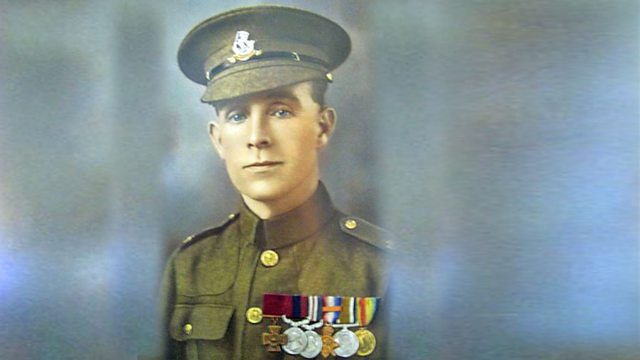Leamington Spa, Warwickshire: The Man Who Didn’t Shoot Hitler
Hitler displayed a picture of the man who he claimed saved his life
Henry Tandey was the most decorated private of WW1. He is notorious for being the man who Hitler allegedly claimed spared his life on the battlefield.
“If you are looking for a real flesh and blood hero, you don’t need to look further than Henry Tandey to see bravery at its rawest,” according to David Johnson, who is Henry Tandey’s biographer.
He shared his story at The Angel Hotel in Leamington, which is the site closest to where this local hero was born and grew up. Tandey had a troubled childhood and joined the army in 1910. He served on the Western Front for four years.
“He really put his life in severe danger to do what he did. He was a brave soldier. Getting a bravery award on the Western Front was a bit of a lottery, needed to get it written up. A consolation prize was a mention in dispatches. He was mentioned 5 times.”
After changing regiments he finally got the recognition he wanted. His acts led to him being described as a hero of the ‘old beserk’ type. When you hear of his acts of bravery you can see why.
He received the Military Medal for bravery on the front line:
“This man exhibited great heroism and devotion to duty. He went out under heavy shell fire and carried a badly wounded man on his back. He then went out again and found three more wounded men and put them under cover. The post was attacked by the enemy in strength. The German officer shot at him point blank and missed. Private Tandey, quite regardless of danger, then led his party against the enemy.”
And was also rewarded the Victoria Cross:
“For desperate bravery and great initiative. He crawled forward under heavy fire, located the machine gun position. He crawled forward putting the planks into position and making the bridge passable under a hail of bullets. He must have seen that the chances of losing his life amounted to almost a certainty. Later in the evening, he was surrounded by an overwhelming number of Germans, and though the position was apparently hopeless, he led a bayonet charge through them, fighting so fiercely that 37 of the enemy were taken prisoner, though he was twice wounded. Even then he refused to leave, and though faint from loss of blood, stayed till the fight was won.”
“He was told by another officer, if you do anything else there isn’t anything else we can give you” - David Johnson.
They tried to turn him into a poster boy. He became the subject of a famous painting which brought with it a different and unwanted claim to fame.
The painting shows a badly bomb damaged crossroads, shattered buildings, no roofs, smoke still rising from ashes. There are soldiers examining the damage, walking around, things strewn all over the streets. In the foreground a soldier is walking forward carrying an injured soldier upon his back. That soldier is noted as Private Henry Tandey.
“This painting was hanging on Hitler’s wall when Chamberlain went to see him in 1939. Hitler is said to have pointed to the painting and said that was the man who saved my life. Please pass on my thanks. Once something has been said often it becomes fact.”
David believes it is all just a fabricated story, that Henry was a pawn used by Hitler to build his public profile and propaganda machine. “In a way Henry was Hitler’s last victim of World War One.”
Location: The Angel Hotel, Regent Street, Leamington Spa, Warwickshire CV32 4NZ
Image: Private Henry Tandey VC. Photograph courtesy of Duke of Wellington's Regimental Headquarters, Halifax; sourced from Wikipedia Commons.
Presented by Siobhan Harrison
Duration:
This clip is from
Featured in...
![]()
�鶹�� Coventry & Warwickshire—World War One At Home
Places in Coventry & Warwickshire that tell a story of World War One
More clips from World War One At Home
-
![]()
The loss of HMY Iolaire
Duration: 18:52
-
![]()
Scotland, Slamannan and the Argylls
Duration: 07:55
-
![]()
Scotland Museum of Edinburgh mourning dress
Duration: 06:17
-
![]()
Scotland Montrose 'GI Brides'
Duration: 06:41







